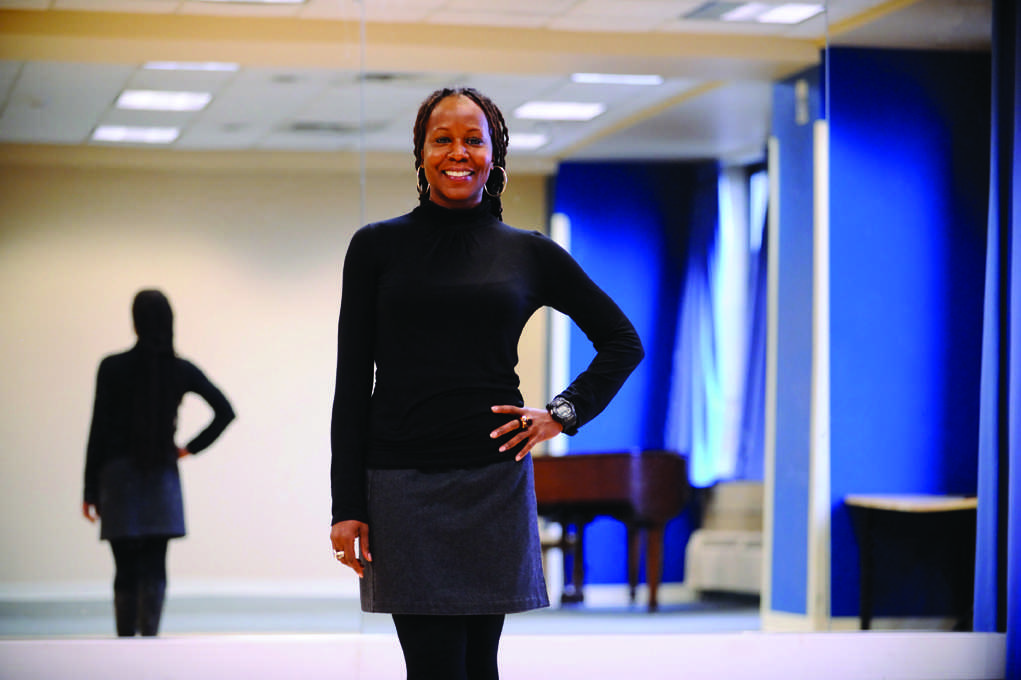Getting to Know Dr. Aimee Cox
Dance Vet and Newest Addition to the African and African American Studies Department at FCLC
August 26, 2011

Like many of her fellow faculty members, Professor Aimee Cox’s resume boasts degrees from the country’s elite universities and extensive work as a writer and anthropologist. She’s recently been titled the new assistant professor of the African and African American Studies department (AFAM) at Fordham College at Lincoln Center (FCLC) and will be teaching a brand new course called Black Feminism. However, something makes Cox stand out in a big way: she was once a professional dancer performing with Ailey II.
“I danced my entire life, from the time I was three years old,” Cox said. Cox is a native of Cincinnati, Ohio. She said dance lessons were just one of the many options her parents gave her as a child to be active and explore the arts. But there was something about ballet that stuck with her.
“I was obsessed with becoming a ballerina. Dance was something that immediately spoke to me. I’ve always been a very physical, very active, very athletic person. But I’ve also been very artistic and emotional and dance combined that physicality and gave my body a means of expression.”
In her high school years, Cox was a pre-professional ballet student at the College Conservatory of Music at the University of Cincinnati. She went to Vassar College to get her undergraduate degree in cultural anthropology, but said dance still played a major role in her college experience. In 1992, she was given the option of finishing school early because of her extra college credits. Instead, Cox opted to spend a semester studying on a scholarship at the Dance Theatre of Harlem (DTH), the world’s first black ballet company. But despite her relative success studying at DTH, she doubted whether ballet was her best fit.
“[I] wasn’t feeling like ballet was the place for me. And that was hard to come to terms with after studying it for most of my life.
After taking some advice from Lowell Smith, one of DTH’s principal dancers, Cox applied to study at the Ailey School to pursue modern technique. She was accepted and studied there the following semester. Noted for her exemplary performance skills, Cox was invited to come back to Ailey after graduating from Vassar and was soon invited to perform professionally with Ailey II. She danced there for two years.
“At Ailey is where I think I fully became a dancer. At the Dance Theater of Harlem, I was still sort of mimicking ballet. But Ailey was where I really was able to understand how dance is about spirit, tradition, and culture.”
Still, Cox said she felt unfulfilled. She decided her best move was to go back to school. A year later, she attended the doctoral program in anthropology at the University of Michigan. She did her field work directing a Detroit homeless shelter for young women ages 16 to 21 called Alternatives for Girls from 2001-2004. “I was really embedded in the site,” Cox said. At the shelter, she closely studied how race, gender, class and sexuality affect the lives of young black women. “I was really focused on being a scholar, and getting my PhD and dance [was] not apart of that. But those young women at the shelter really in a profound and beautiful way brought me back to dance. [T]hey were starting to dance and write poetry and they were using it as a way to kind of create a healing space for themselves.”
The residents of the shelter wanted to expand their experimentation with dance and poetry; thus The BlackLight Project was created in 2005. “These women weren’t trained dancers, but they were using their bodies and their voices to talk about their own personal experiences and then connect them to each other’s experiences.” The methodology was simple: the girls were to write about their experiences and to use their bodies to tell the stories. The product was a grassroots movement of politically-conscious performances pieces portraying urban issues surrounding education, local government and women’s rights shown throughout Detroit.
“It moved from this internal space in the shelter to something that was literally on the streets of Detroit.” The experience inspired her dissertation and her book, “Shapeshifters: Black Girls and the Choreography of Citizenship.”
Cox finished doing her fieldwork at Alternatives for Girls, but she certainly was not finished with BlackLight. After obtaining her PhD, Cox brought BlackLight to Newark once she started teaching at Rutgers-Newark University. She was happy working at Rutgers but leaped at the job opening in FCLC’s AFAM department. “This job just spoke to me. I had no real hopes that I would get it, but I thought it would be so crazy not to apply for it because it was just so much of who I am.” In addition to teaching the course African Americans in Film, Cox’s brand new course, Black Feminism, will cover feminist theory and how black female artists across genres have impacted the world. “It’s hard to sell African American Studies classes because people think they’re just for black students. But the whole point behind the emergence of [AFAM] was to talk about the humanism of liberal arts…even though black feminism seems so exclusive and closed off, really the core of black feminism is to talk about everybody’s humanity and the need to address that. [T]he discipline is all about the universality of experience.”








